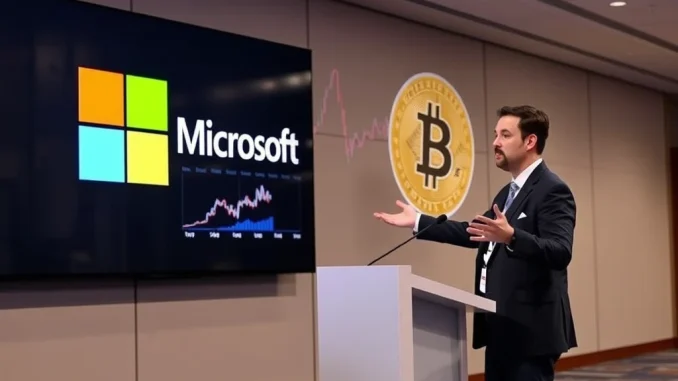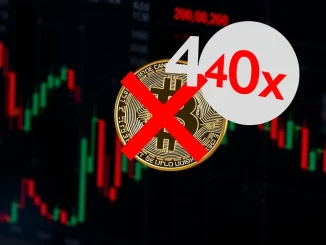
Imagine one of the tech world’s giants, Microsoft, taking a massive leap into the volatile yet potentially rewarding world of Bitcoin. That’s exactly the bold suggestion put forth by Michael Saylor, the well-known founder of MicroStrategy and a vocal Bitcoin advocate. At the recent Strategy World 2025 event, Saylor didn’t mince words, urging Microsoft to abandon its traditional practice of stock buybacks and instead funnel that capital into Bitcoin (BTC Investment).
Why Michael Saylor Thinks Bitcoin Beats Stock Buybacks
Michael Saylor’s argument is rooted in performance data and a unique perspective on what constitutes valuable corporate capital. He highlighted the significant disparity in returns between Bitcoin and Microsoft’s stock over recent years. According to reports from the event, Saylor pointed out that Bitcoin has delivered an annualized return of a staggering 62%, while Microsoft’s stock has seen returns closer to 18% over the same period. This dramatic difference forms the core of his pitch.
But it’s not just about past performance. Saylor views Bitcoin as a superior form of “digital capital.” He argues that unlike traditional assets, including a company’s own stock, Bitcoin offers protection against inflation and market volatility driven by macroeconomic factors or corporate-specific issues. He sees it as an asset free from corporate control and political influence, offering a pure, decentralized store of value.
Understanding Stock Buybacks: What Microsoft Does Now
Before diving deeper into Saylor’s Bitcoin proposal, it’s helpful to understand what stock buybacks are and why companies like Microsoft engage in them. Essentially, a stock buyback is when a company purchases its own outstanding shares from the market. This reduces the number of publicly available shares, which can:
- Increase the earnings per share (EPS), making the company appear more profitable on a per-share basis.
- Boost the stock price by increasing demand and reducing supply.
- Return value to shareholders in a tax-efficient way compared to dividends (in some jurisdictions).
- Signal management’s belief that the stock is undervalued.
Microsoft, like many large, profitable corporations, regularly allocates billions of dollars to stock buybacks as part of its capital allocation strategy. It’s a standard practice aimed at enhancing shareholder value.
The Bold Alternative: A Massive BTC Investment
Saylor’s proposal is a direct challenge to this conventional wisdom. Instead of using billions to repurchase shares, he suggests Microsoft should use that capital for a substantial BTC Investment. He believes this would not only offer potentially higher returns but also provide a hedge against the depreciation of fiat currency and diversify the company’s treasury assets beyond cash and traditional financial instruments.
Think about the scale: if Microsoft were to redirect a significant portion of its buyback budget – which can be tens of billions annually – into Bitcoin, it would be one of the largest corporate holders of the cryptocurrency globally, potentially second only to Saylor’s own MicroStrategy.
Potential Benefits for Microsoft
Why might Microsoft even consider such a move? The potential benefits, according to Saylor and other Bitcoin proponents, include:
- Enhanced Returns: As Saylor highlighted, Bitcoin’s historical performance significantly outpaces traditional assets. While past performance is no guarantee, the potential for high returns remains a key draw.
- Inflation Hedge: Bitcoin is often touted as a hedge against inflation due to its capped supply. Holding BTC could protect Microsoft’s purchasing power over the long term.
- Diversification: Adding Bitcoin to the balance sheet diversifies treasury assets away from just cash, bonds, and company stock, potentially reducing overall portfolio risk (though adding new crypto-specific risks).
- Innovation & Leadership: Embracing Bitcoin could position Microsoft as a forward-thinking technology leader in the digital asset space, potentially attracting talent and new business opportunities.
What Are the Risks and Challenges?
Of course, a move like this isn’t without significant hurdles and risks. For Microsoft, these would include:
- Volatility: Bitcoin is notorious for its price swings. A large BTC Investment would expose Microsoft’s balance sheet to considerable volatility, which could impact earnings reports and investor confidence.
- Regulatory Uncertainty: The regulatory landscape for cryptocurrencies is still evolving globally. Governments could introduce policies that negatively impact Bitcoin’s value or restrict corporate holdings.
- Shareholder Reaction: Many traditional investors might be wary of a major tech company holding a volatile, unregulated asset like Bitcoin. This could lead to negative market reaction and pressure from shareholders.
- Custody and Security: Securely managing a large holding of Bitcoin requires specialized expertise and infrastructure to prevent theft or loss.
- Accounting Challenges: Accounting rules for cryptocurrencies can be complex and vary by jurisdiction, potentially adding administrative burden.
Could Microsoft Follow MicroStrategy’s Lead?
Michael Saylor’s MicroStrategy has famously adopted a corporate strategy centered around acquiring Bitcoin, holding tens of thousands of BTC on its balance sheet. While MicroStrategy is a software company, its business model has become closely tied to its Bitcoin holdings. Microsoft is a vastly different, much larger, and more diversified entity.
Implementing a similar strategy at Microsoft’s scale would be unprecedented for a company of its size and profile. It would signal a major shift in corporate finance within the traditional tech sector. While other companies like Tesla have temporarily held Bitcoin, none have adopted it as a core treasury reserve asset in the way MicroStrategy or as Saylor proposes for Microsoft.
Actionable Insight: What Does This Mean?
Saylor’s call to action, urging Microsoft to prioritize a BTC Investment over traditional Stock Buybacks, highlights a growing debate in corporate finance. It forces companies with large cash reserves to consider alternative assets beyond low-yield bonds or simply returning capital via buybacks. While Microsoft may not immediately heed Saylor’s advice, the public nature of his challenge puts the idea on the table for discussion among executives, boards, and shareholders.
For investors, it underscores the perceived potential of Bitcoin as a long-term store of value and growth asset, even being recommended for the balance sheets of the world’s largest corporations.
Concluding Thoughts: A High-Stakes Debate
Michael Saylor’s provocative suggestion for Microsoft to swap Stock Buybacks for a massive BTC Investment is more than just a headline; it’s a powerful statement about the evolving view of capital in the digital age. He believes Bitcoin’s superior performance and unique properties make it a compelling alternative for corporate treasuries, even for a company as established as Microsoft. While the risks are real and the challenges significant, the potential rewards, as highlighted by Bitcoin’s historical gains, are hard to ignore. Whether Microsoft, or other tech giants, will ultimately embrace this vision remains to be seen, but the debate ignited by Michael Saylor is set to continue.



